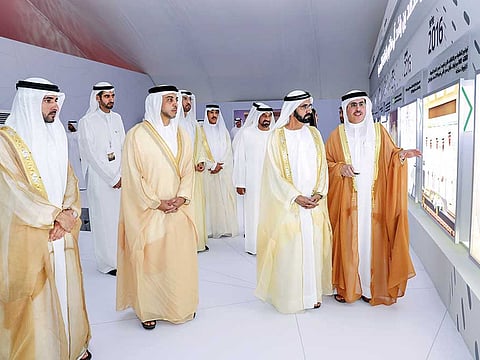Mohammad Bin Rashid opens world’s largest solar park
The second phase can generate up to 200 megawatts of clean energy

Dubai: The second phase of Mohammad Bin Rashid Al Maktoum Solar Park that will generate 200 megawatts of clean energy will pave the way for a more “stable electricity tariff rates” in the long run, officials said on Monday.
The park was inaugurated by His Highness Shaikh Mohammad Bin Rashid Al Maktoum, Vice-President and Prime Minister of the UAE and Ruler of Dubai.
Shaikh Hamdan Bin Mohammad Bin Rashid Al Maktoum, Crown Prince of Dubai, Shaikh Mansour Bin Zayed Al Nahyan, Deputy Prime Minister and Minister of Presidential Affairs, and Shaikh Nahyan Bin Mubarak Al Nahyan, Minister of Culture and Knowledge Development, were also present during the event.
The world’s largest single-site solar park located near Al Qudra in Dubai can generate up to 200MW solar energy daily, enough to power 50,000 residences for one year. With more than 2.3 million thin-film photovoltaic panels spanning 4.5 square kilometres, the second phase can save annual carbon emissions of up to 214,000 tonnes.
The Dh1.2 billion project is part of a multiphase solar park that, when completed, can generate up to 1,000MW of clean energy by 2020 and up to 5,000MW electricity by 2030, with a total investment of Dh50 billion. It is one of the major projects of the Dubai Electricity and Water Authority (Dewa).
“This is the first and largest project of its kind in the region, based on the Independent Power Producer (IPP) model. The UAE has started its early preparations to bid farewell to the last drop of oil to fulfil the vision of our wise leadership. We are doing this by implementing a clear strategy that includes investments in energy projects that use various solar power technologies,” Saeed Mohammad Al Tayer, Managing Director and CEO of Dewa, said.
Al Tayer said the second phase was turned over ahead of schedule and accomplished through Dewa’s partnership with the consortium led by ACWA Power from Saudi Arabia and the main contractor, Spain’s TSK. The project was completed in 13 months, clocking 1.5 million safe man hours.
Asked how the new project would impact common households, Al Tayer said it was too early to tell but the park has a definite impact now.
“If you look at this project, for the time being, this is 200MW out of a 10,000MW installed capacity. So it is even less than one per cent of [the system]. You cannot determine the impact on a single segment but the positive impact is there will be no increase in [fuel] surcharge as there has been no increase in recent years,” Al Tayer said.
Al Tayer said the electricity tariff rates for the lowest usage slab at 23 fils/kilowatt-hour is still relatively cheap compared to India or in the UK at 90 fils per kWh.
Paddy Padmanathan, President and CEO of ACWA Power, said the general public will reap benefits eventually once more renewable energy is produced.
“If you use fossil fuel, energy cost will keep going up. Here, once we have built the solar plant, there is no energy cost. God doesn’t charge us for the sunlight. As more renewable energy gets deployed in the long run, electricity tariffs will be more stable because we don’t pay for fuel cost. Fuel costs fluctuate,” Padmanathan said.
Residents should also look at the gains holistically.
“Fossil fuel emits carbon and pollutants, renewable energy doesn’t. So over the long run, it should have significant environment and health benefits particularly in a city like Dubai, which is very urban,” he said.
Once completed, the solar park will produce clean energy that could reduce carbon emissions by more than 6.5 million tonnes annually.
Solar park’s four phases
In January 2012, His Highness Shaikh Mohammad Bin Rashid Al Maktoum, Vice President and Prime Minister of the UAE and Ruler of Dubai, launched the Mohammed Bin Rashid Al Maktoum Solar Park, the largest single-site solar park in the world.
First Phase: On 22 October 2013, the 13MW first phase of the solar park became operational.
Second Phase: The 200MW second phase of the solar park was opened on March 20, 2017.
Third Phase: In June 2016, Dewa announced the Abu Dubai Future Energy Company (Masdar)-led consortium as selected bidder for the 800MW third phase of the solar park.
Fourth Phase: Concentrated Solar Power (CSP) Project: Dewa is also working to build the largest Concentrated Solar Power (CSP) project in the world, based on the IPP model. The 200 megawatt first phase of the CSP plant will be operational by April 2021, and Dewa will generate 1,000 megawatts using this technology by 2030.
200 megawatt capacity
- Over 2.3 million thin-film photovoltaic panels
- Can power up to 50,000 residences annually
- Over 1,100 manpower to build the plant
- 23 fils per kilowatt hour, the lowest tariff globally upon project tendering
- Over 1.5 million safe man hours without lost time to injury
- Cleaning is done every three weeks; if it’s dusty, energy generation could go down to 170MW
Sign up for the Daily Briefing
Get the latest news and updates straight to your inbox



